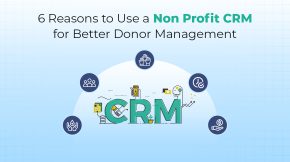Synergizing Business Intelligence and CRM Tools: Elevating Your Data Strategy
Modern businesses engage with customers across numerous touchpoints, including social media, websites, email campaigns, and face-to-face interactions. These engagements generate vast amounts of valuable data which, when effectively integrated, can offer a comprehensive view of each customer. Data integration within CRM involves consolidating data from various sources into a unified and centralized platform.
This process merges customer information gathered from different systems, applications, and departments within an organization. By breaking down data silos and establishing a cohesive framework, businesses gain a holistic understanding of their customers. This enables them to make informed decisions based on data and deliver personalized experiences.
The BI and CRM Relationship
BI and CRM complement each other, and for optimal operations, organizations need both tools to work simultaneously.
Customer Relationship Management (CRM) stands out as a proven and highly effective method for maintaining consistent customer service levels. This system gathers and consolidates raw data from customer interactions into a centralized database. By combining this data with a BI solution, organizations can expedite decision-making processes.
Giving a push to Customer Loyalty and Retention
CRM proves invaluable in boosting revenue and controlling costs within a business. It serves as a potent tool for enhancing organizational management, productivity, and overall efficiency by consolidating relevant business activities into a single database.
Users can leverage CRM data for various types of analyses, including:
Insights for Marketing Strategy:
- Analysis of leads and contacts
- Evaluation of marketing campaigns
Insights for Sales Operations:
- Assessment of accounts and opportunities
- Examination of opportunities and contacts
Insights for Customer Onboarding & Success:
- Review of accounts
- Examination of support cases
Maximizing Business Intelligence with CRM Tools: Leveraging Data for Success
Business Intelligence plays a crucial role in shaping the CRM strategy of your organization. Unlike a magical black box, CRM is a toolset that requires customization to meet specific business needs effectively.
The quality of insights depends on the quality of the underlying data. While both BI and CRM solutions offer reporting capabilities, they differ in their data-sourcing capabilities. CRM systems can access data only from connected databases, limiting their scope if data is stored externally. On the other hand, BI collects raw data from various sources, creating a central repository for comprehensive reporting.
CRM and Business Intelligence together provides companies with a single source of truth, enabling clear visualizations through charts, graphs, maps, and more. This combined approach ensures accurate insights and informed decision-making for enhanced business performance.
Integration Considerations
While aligning CRM Business Intelligence with sales tools is crucial for maximizing CRM investment, achieving optimal integration is essential for ensuring smooth communication.
Dashboard tools prove particularly effective in consolidating data into a single platform, simplifying information management and analysis.
Selecting CRM and sales tools with APIs is advisable, as it enables seamless connection to your centralized data platform. Closed platforms that do not facilitate data flow hinder alignment between different tools. Typically, developers are needed to ensure optimal connection and seamless collaboration between systems.
Before proceeding to practical implementation, it’s crucial to have a thorough understanding of your business objectives. Complete integration heavily relies on precisely defining these objectives, which serve as a guiding framework throughout the integration process.
Once your CRM Business Intelligence is ready and fully integrated, here are some actionable steps you can take:
- Advanced customer segmentation: Utilize your CRM’s segmentation capabilities to create more refined customer groups based on similar buying behaviors, allowing for personalized offers.
- Sales automation scenarios: Configure personalized email sequences based on customer actions tracked in the CRM, automating sales follow-ups and nurturing campaigns.
- Customer reactivation campaigns: Launch targeted reactivation campaigns using CRM data to reengage inactive customers. Offer personalized incentives to encourage potential purchases.
- BI dashboards: Develop customized dashboards for each department, showcasing key performance indicators (KPIs) for quick decision-making. This enables you to streamline sales cycles and enhance efficiency.
- BI and benchmarking: Leverage BI insights to compare your company’s performance with that of competitors, allowing for strategic adjustments to optimize competitiveness and market positioning.
- Brainstorming sessions and BI: Organize brainstorming sessions based on BI reports to identify growth opportunities, trends, and necessary strategic adjustments. Utilize BI data as a foundation for informed discussions and decision-making.
Accurate Sales Forecasts and Predictive Analytics
Integrated data empowers businesses to harness predictive analytics and generate accurate sales forecasts. By analyzing historical data, customer behavior patterns, and market trends, organizations can proactively anticipate customer needs, identify potential upselling or cross-selling opportunities, and optimize their sales strategies accordingly.
These insights enable decision-makers to make informed choices, allocate resources effectively, and maximize revenue generation, ultimately driving business success.
The need for an Analytical CRM
With a focus on data analysis, analytical CRM empowers top management, sales teams, and support staff to enhance customer service through various strategies. By gathering data from multiple sources, organizations gain valuable insights into customer behavior, enabling a deeper understanding of organizational functioning.
This analytical approach leads to improved decision-making, more effective campaign management, enhanced sales and support processes, and overall stronger customer relationships. Perceptive analysis uncovers subtle customer behavior patterns, aiding in lead conversion and sales forecasting, thus shaping future policies.
Linking customer behavior with intent enables organizations to deliver personalized customer experiences, meeting expectations throughout the buying cycle. Analytical CRM is the ideal choice for businesses that prioritize data-driven decision-making and seek to benefit from lead generation, especially service providers and account-based sales organizations.
Preparing a data-driven CRM Strategy
Even with a data-driven strategy in place, it’s important to remain vigilant for potential issues that may arise. Conducting periodic strategy audits allows you to assess your progress towards CRM goals and identify any areas that require attention. This enables you to make necessary adjustments to your CRM strategy as needed.
While auditing your system, consider the following key areas:
- Data Assessment: Evaluate the quality of your data and ensure compliance with regulatory requirements, such as the General Data Protection Regulation (GDPR). Verify that data is collected legally and under strict conditions, and that measures are in place to protect it from misuse.
- Gaps in the System: Identify any shortcomings in your integrated system and determine what functionalities it lacks.
- Employee Satisfaction: Assess employee satisfaction with the new system by conducting interviews and surveys. Shadowing employees can also provide insights into their proficiency in using the system.
- Results: Analyze the impact of the new system on key metrics, such as customer churn and average time to close a lead.
The integration of CRM and Business Intelligence tools provides your business with valuable insights that inform more informed decision-making. By leveraging these insights, you can effectively address challenges, optimize processes, and drive business growth.
Conclusion
Data integration in customer relationship management presents numerous advantages for businesses. By obtaining a comprehensive view of customers, enhancing targeting and engagement, streamlining processes, and accessing predictive insights, integrated data enables organizations to forge stronger relationships, provide exceptional experiences, and foster sustainable growth. Through harnessing the power of data integration, businesses can fully leverage the potential of their CRM systems and maintain a competitive edge in today’s marketplace.
Ready to unlock the full potential of your CRM system with data integration? Contact us today to discover how integrated data can empower your business to build stronger relationships, deliver exceptional experiences, and drive sustainable growth.
Let’s take your CRM strategy to the next level! Contact us at [email protected]












